I met Ximena Abello virtually a few months after the COVID-19 pandemic started. She was living in London and I in Munich. Same continent, different countries, the same situation of confinement.
Talking to her, I noticed several things. The first was perhaps the softness of her voice, somewhat melodic and shy at the same time.
Discovering Ximena
Ximena is a native of Bogotá, Colombia. She is a lyrical singer. She studied at the Pontificia Universidad Javeriana and moved to London to pursue a Master’s degree in performance at Goldsmiths University. She ended up staying a few more years, actually four and a half more.
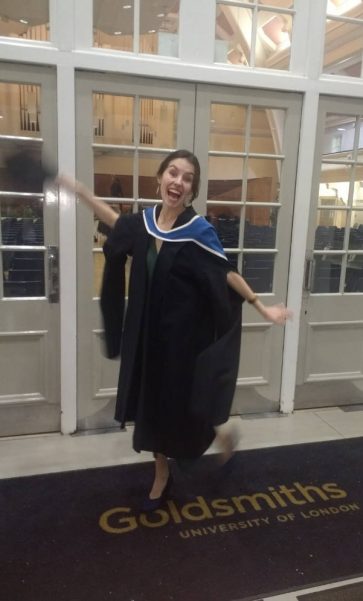
But going into the subject, I personally don’t know any other way than asking questions, several questions.
L.Viera: How did you start with the whole music thing?
X.Abello: Well, since I was very young I have been involved in music. I attended a music academy in Bogotá, the Piccolo Music Academy.
L.Viera: How was the experience at the academy?
X.Abello: Actually, before I entered the music academy my grandmother was married to a Luxembourger and he was a lyric singer and he was my first singing teacher. When he realized that I had an ear, he told my mom you have to get her into a music academy.
L.Viera:: Ok, he was very accurate.
X.Abello: When I entered the academy I did the whole program because I entered at a very young age. I entered at the age of 4 until I graduated at 18. I started with initiation, with recorder, then I had piano lessons. But I kind of loved to sing and at that time I dreamed of being like Shakira. And at that time, the piano education was very classical, the Russian school. But in reality, it was always singing, as the other instruments complimented me to be able to sing and accompany me.
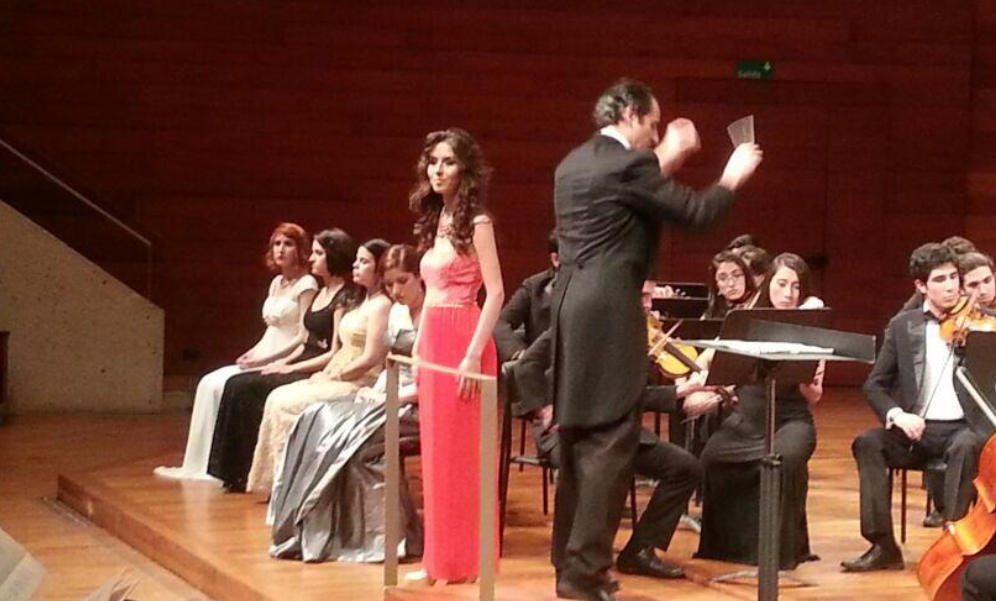
L.Viera: Ok, Ximena, and how did things evolve?
X.Abello: All my life I have also loved education, so I have worked in summer camps, in music academies, I have worked in the children’s program of the Javeriana University, while I was a student I was a monitor of different classes and I was a singing teacher of different faculties. I loved the idea of learning and giving a little bit of what I learned.
Music education
Before analyzing what music education consists of, it is essential that we think about how music is present in our lives.
The truth is that living without music would be almost impossible.
Music fulfills several functions: it helps us to dream, it keeps us company, it relieves our worries, it cheers our spirit, it liberates us.
Music is composed of three basic elements: rhythm, melody, and harmony.
Rhythm is the first element, without which there can be no musical expression and is an indicator of physical life, it gives life to music. It is one of the most common ingredients of music. Rhythm is a form of repetition.
Melody is the expressive element of music, what impacts us, what we remember.
Harmony, which requires a level of intellectual elaboration, knowledge of the musical language, and a combination of the previous elements.
These three elements are also present in our human nature. Let’s keep in mind that our voice is our melody, with it we express different moods, feelings, emotions, it is our particular music, that makes us different from each other.
Some of the effects of music on human development are:
Understanding: understanding and language are aided by the ability to process information more quickly. Children who listen to music on a regular basis have a higher IQ.
Emotions: emotions and moods are directly linked to music. For example, soft notes help calm, while creative or more upbeat music helps stimulate.
Intelligence: listening to music during childhood helps to create certain patterns in the brain. All people are born with billions of neurons and if they are not used over time they disappear. By being exposed to music, more neurons develop, and then it is easier to learn new things and develop new talents.
Memory: From the age of three months, children can remember what they have heard.
So, you could say that music has a profound effect on people’s mood, intelligence, memory, and language. We see the impact of music every day.
Creating the academy
The Ximena Abello Music World was officially born in January 2019. Before starting, Ximena got a job on a cruise ship. She spent five months working on the high seas with her husband. Obviously, this put the academy on pause while she returned.
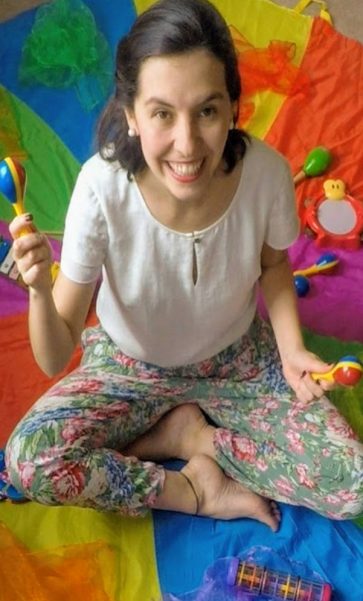
L.Viera: And when you finished your master’s degree, what happened?
X.Abello: As soon as I graduated I said, if I am going to stay I have to do something that is related because otherwise there is no point in staying. I started working in a place called Gymboree Play and Music that works with children from zero to five years old. That’s where I started, I spent almost a year and a half working there and I started to realize that I had my private students at the same time.
L.Viera: aha… and what happened when you realized that you had this duality?
X.Abello: I said like, this is the opportunity to let go and create my own company because I wasn’t giving myself the time to have more students because it clashes with my job. So, one day I said if I want to do it I have to do it now or else I’m going to lose that moment.
L.Viera: And what did you do at that moment… because you were setting up your academy, and you had your students and then also the cruise…?

X.Abello: Fortunately it was summer, many had trips and it was easy to tell them, the truth is that this came up and I don’t want to lose this opportunity. And so it was, I left my students with a teacher in charge and nothing, I came back in September to resume the academy and that’s where I am.
L.Viera: Let’s see, teaching is not easy. It is one of the most difficult things there is. What made you think of giving your knowledge to the little ones?
X.Abello:: Well, the first thing is that I love children and I love the energy they give you. So, as I told you since I was a little girl I have been surrounded by children and also because my family has an adoption home in Colombia. So, in some way or another, I have always been surrounded by children and babies and it was something that happened very organically. It was in London that I discovered my passion for teaching at an early age.
Musical Initiation
Introducing young children to the world of music can begin at home. Children can learn sounds and rhythms simply by listening to children’s songs or by parents clapping their hands while the song is playing. Bringing music to children is very easy to do and really effective.
However, children and babies should not be limited to listening exclusively to lullabies. Obviously, they have the capacity to enjoy and remember different types of music, and this in turn will help them to recognize and enjoy it.
Songs with simple, repetitive lyrics that include onomatopoeias are recommended. However, it is not advisable to restrict the child’s access to music. It has been proven that babies and children are very receptive to classical music of easy structure and short duration.
L.Viera: Ximena, but you studied lyrical singing… pardon my ignorance… how does that work with teaching for early ages?
X.Abello: Lyric singing gave me a very high-pitched voice and it educated my voice very much for that register. And it is a voice that is very useful with the early ages because with those ages it is very much about a high-pitched sound, experimenting with the senses, many faces, many songs that involve descriptions with the voice.
Ximena has students of various ages. From newborns to whom she gives sensory stimulation to teenagers who are preparing for college tests.
So far the most difficult part of teaching children and teenagers is sometimes finding the right method to teach them. That is, knowing how to apply each methodology to each person, “I can have two 7-year-old students, one who is still in Disney mode and another who prefers Ariana Grande,” Ximena concludes.
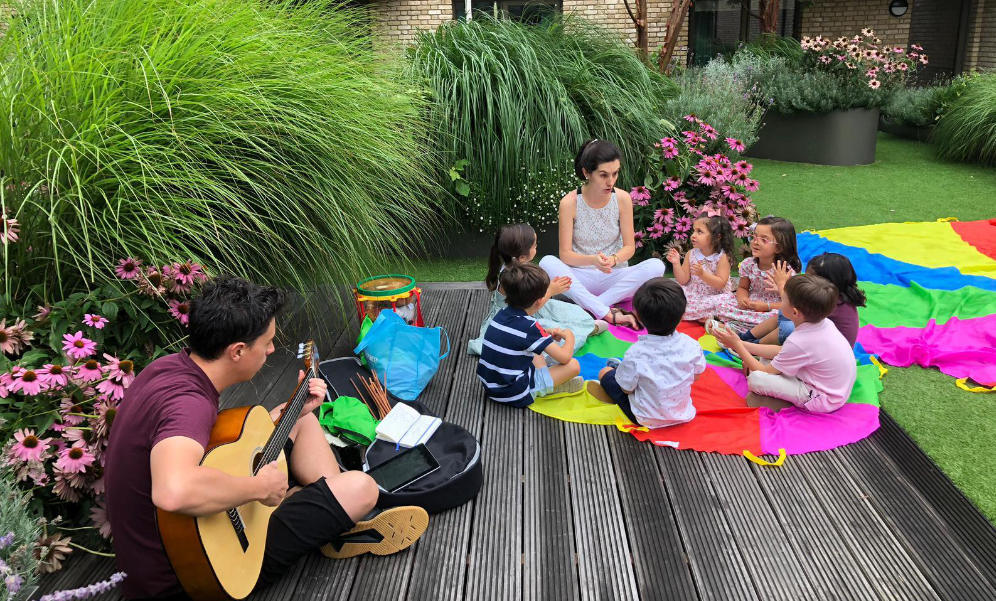
She likes to be approachable, she does not like to be seen as a distant teacher who cannot be asked questions.
Ximena is very familiar with her students, which makes her think that this has been part of her success in London since the Latin culture has that closeness and affection. And, obviously, British parents were not used to that.
It is important to keep in mind that making music in a group stimulates the social development of children. In order to make music, they must be aware of each other, be literally and figuratively well attuned, and work together.
When listening to music, movements occur spontaneously. Children turn music into movement, especially when it is classical music.
Music in our lives
But, not to go so far we just have to realize that our body is full of rhythm: our heartbeat, our blinking, yawning, respiratory or digestive functions, all obey a vital rhythm, a synchronized rhythm. All our actions have a rhythm and each person imprints a particular rhythm.
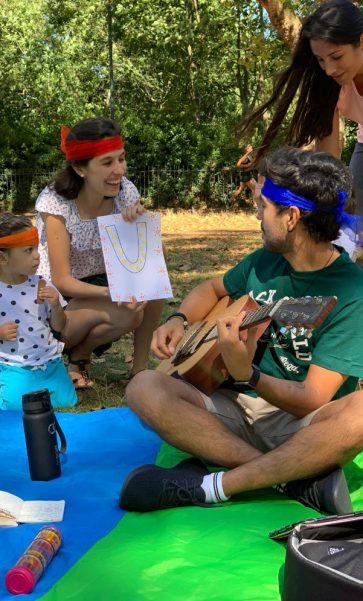
L.Viera: What would you like to achieve?
X.Abello: My objective is really to be able to continue educating more children in music and to be able to transmit to them the passion for an instrument, or for singing, to be able to give them a little of what it means to have music close to them in life.
Now everything is very visual, but I dream of having a space with cool pianos, and being able to make group classes that are interesting and above all, to create that differential seal. I want it to be something new, for people to be passionate about my program.
Music is also a cultural product and, as such, it should seek the identification between discipline and life.
This kind of music represents a society in the universe. Many of us, who were born in lands that were conquered hundreds of years ago, have a culture with indigenous, French, German, Nordic, or Spanish origins.
In the Colombian case, we are a multicultural country, whose legacy must be defended and transmitted. With the help of education, our cultures are brought to life and strengthened.
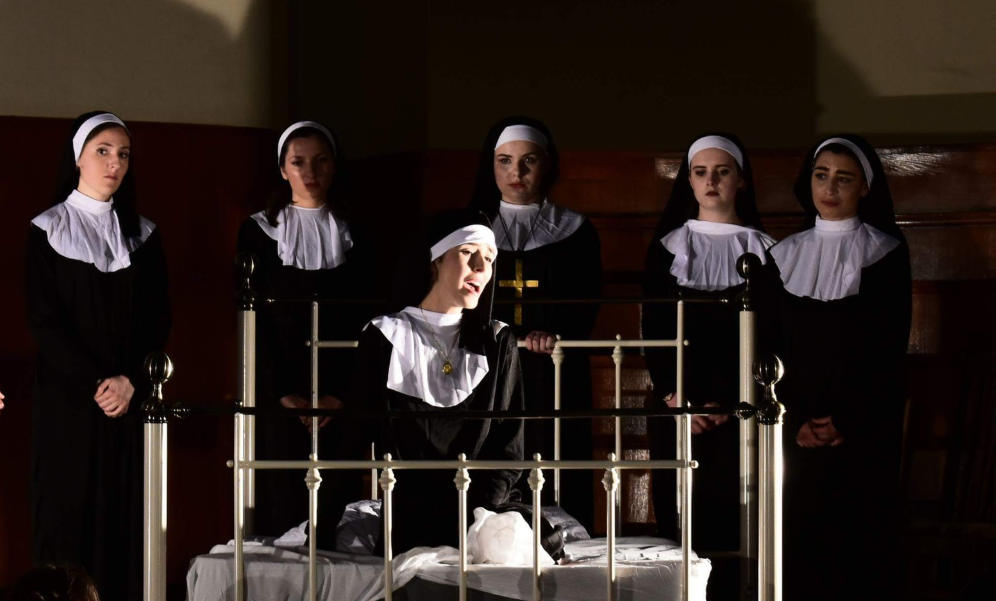
Abello assures me that without a doubt, a large part of the reason why she has advanced so much and although she has been “afraid” to start her academy, she has never taken a step back has been the support she has received from those around her.
Support such as that of her parents and brother, who never made her doubt that music was the right choice for her life.
On the other hand, the support of Isabel Irisarri, who is the director of the piccolo music academy. She is a very important guide. Or her singing teacher in Colombia, Carolina Plata, who guided her all the way.
A universal language
Music is a universal language capable of awakening unique emotions and sensations. Sometimes you hear someone singing in an unknown language, but you manage to feel what they want to transmit, even if you don’t know specifically what the lyrics are saying.
Science has been able to establish that musical rhythms stimulate different areas of the brain. In fact, research from the University of Florida suggests that musical rhythms offer more brain activation than any other known stimulus.
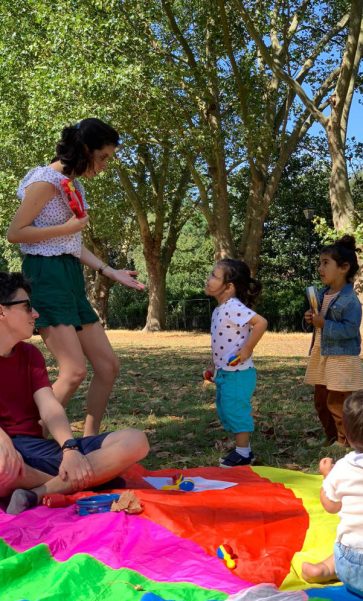
Among the main positive effects are the following:
1. It strengthens learning and memory.
2. It regulates stress-related hormones.
3. It allows to evoke experiences and memories.
4. It modulates the speed of brain waves.
Believe it or not, music has very positive effects on human behavior. Undoubtedly, it stimulates emotional intelligence, within the different bits of intelligence, this is the one that controls emotions. In this way, children learn to socialize better. They understand feelings better.
Music reinforces in a positive way that children can express themselves better. In a way, music is a communication code.
Music also develops the locomotor part of the brain. When combined with dance, it stimulates the senses, balance, and muscular development.
L.Viera: If you did not do this, what would you do?
X.Abello: I don’t know because since I was a little girl I knew I wanted to study music.
L.Viera: How is a virtual class in your academy?
X.Abello: I started to invent a lot of methodologies, and nowadays as it is by zoom, I have the magic notebook, I open it and I show them things, I share screens and I share documents that I have been creating with activities for them. This has made the class very dynamic and they get involved even though I am not there. I play music, use instruments, if it is more physical, my room is now decorated. I think the secret is that the classes have something different for them to connect.
L.Viera: When the whole COVID thing started, where were you… in London or in Colombia?
X.Abello: I was in London, I was teaching classes and you can say that we were not waiting for it because Italy happened, we were a week behind them and we were beginning to repeat history. When we started to see that we were going there, I was able to explain to my students and their parents that the idea was that they were going to put the computer like this, they were going to see me like this, it is important to see this part of their body, or to sing this part. Really, it was easy to adapt because we already saw it coming.
L.Viera: How do you think this era of social distancing has affected or is affecting young children?
X.Abello: Well, I feel that the children are starting to ask for space. Well, in the beginning, I used to tell them let’s get centered and start the class… now they want to run, explore more. I think they communicate things very much with their bodies. What I do, for example, in the group class that I have is that I already have a song that is the “brincadera” song. Then, we get on our feet and jump like crazy, to another all that energy we feel, while we sing and feel the rhythm and march. You also have to let them do that because you can’t expect them to sit and be quiet all day.
L.Viera: What do people not know about Ximena?
X.Abello: The struggles one goes through. I open the camera and I’m encouraging the kids because I can’t start a class as I’m tired, sad, I didn’t sleep well last night. They don’t know what one suffers inside. One carries many battles, of wanting to be better at what one does, of wanting to achieve the dream that one has not achieved,
When Ximena and I met, she was living in London and although she was really happy about her achievements, I could feel a melancholic tinge in her. At that time I asked her if she missed Colombia and she did not hesitate to tell me that she missed the country and her family.
Some months later, we were able to resume our conversation, a conversation that took place virtually and in which we met again in different parts of the world.
L.Viera: How was the return to Colombia?
X.Abello: The truth is that it has been spectacular.
L.Viera: Are there things to do in Colombia?
X.Abello: There are many things that can be done, that are yet to be explored. I would like to go back to my country, to do many things that I have in mind.
L.Viera: What would you like to do?
X.Abello: I would like to arrive and set up my academy there and put all my strength into it. I would like to do small opera productions. One opera per neighborhood.
L.Viera: I don’t know how it works in the UK, but in Germany art is for everyone, whether you have money or not. So if you could bring opera to the most marginalized neighborhoods, it would be a hit.
X.Abello: Exactly. Colombia has many fields that are very virgin. So it would be great to be able to give back to the country all the opportunities one has had.
Early music education (children from 2 to 5 years old), aims at the discovery and development of the child’s expressive, musical and psychomotor abilities.
According to a study, learning to play an instrument or taking music lessons can influence and stimulate children’s cognitive, creative, aesthetic, musical, social, and psychomotor skills. In terms of intelligence, music promotes attention span and concentration, thus increasing their performance at work.
Concluding for now
So, to conclude this pleasant and beautiful conversation I am left with a lot of information about the importance of music in our lives.
The first of them is that the notion of music as a “universal language” alludes to the fact that every time we listen to music, we can feel that we understand it, even if there is nothing figurative in it. It seems that music manages to communicate emotions in an unmediated way, without references, symbols, or conventions.
Music consists of patterns and by listening and playing music, the brain becomes more sensitive to the patterns of perception.
Learning to make music also requires concentration, the ability to focus attention, and perseverance.
For this very reason, when you have a good teacher, who also knows how to offer fun songs to students and how to encourage them to continue, playing music can also provide fun, relaxation, and creativity quickly.
Besides being a great woman, cheerful and full of life force Ximena Abello is committed to the development of the little ones. Daily she shows us that physical boundaries and languages are not important when music is involved. We all understand music and although it cannot influence and impact us all in different ways, it affects us all in some way.


